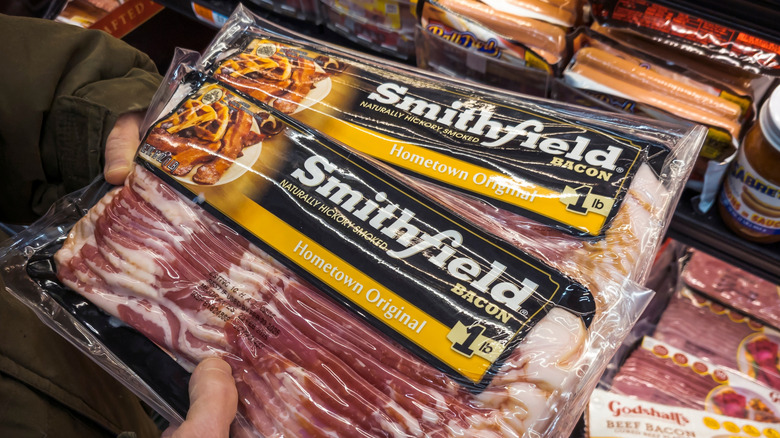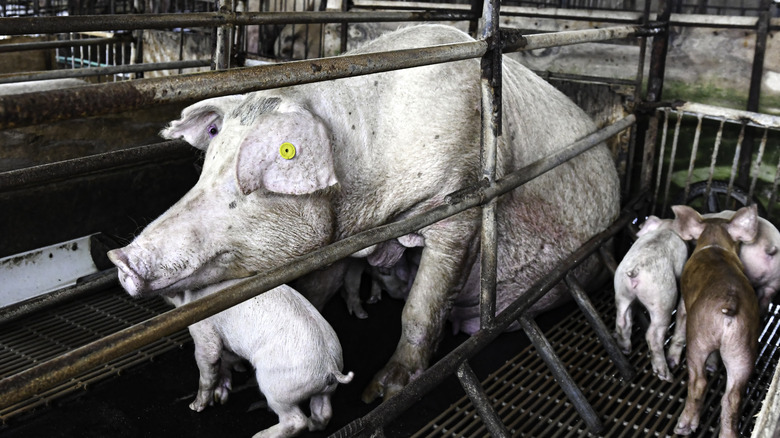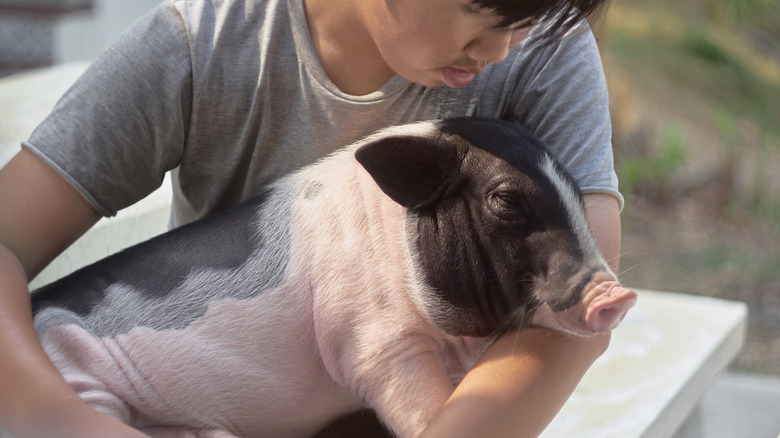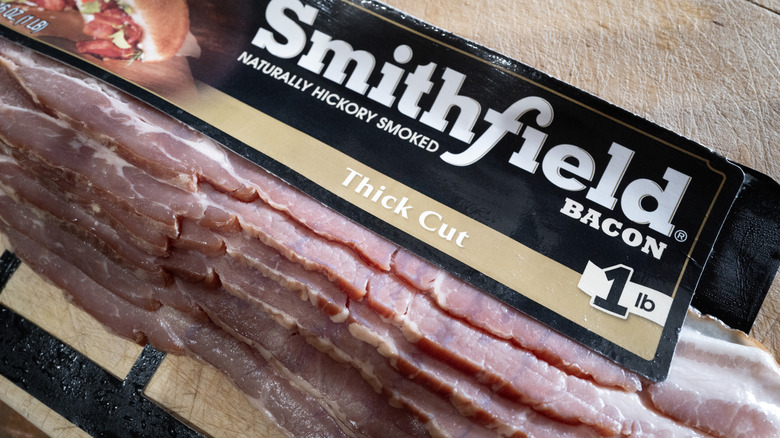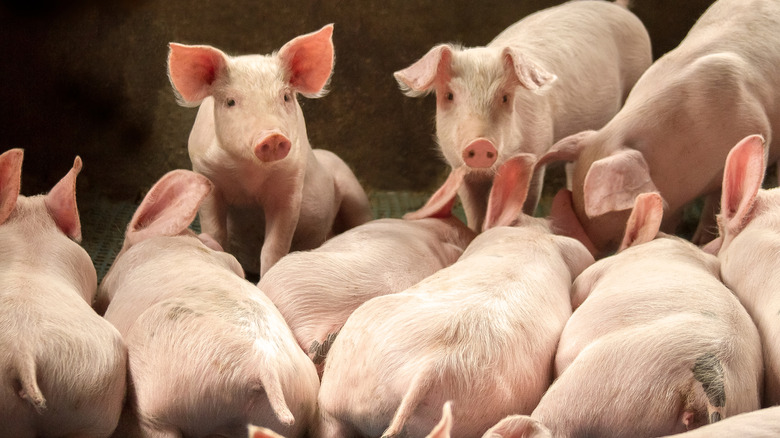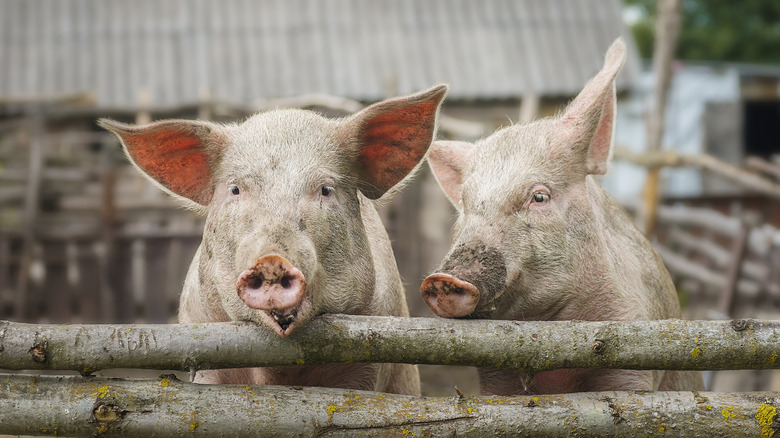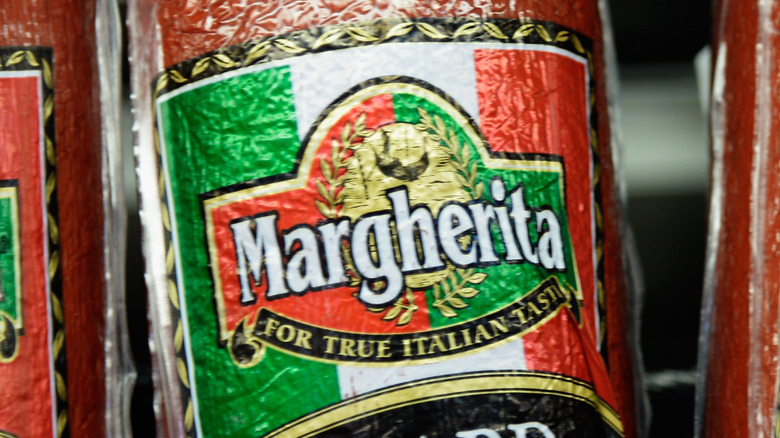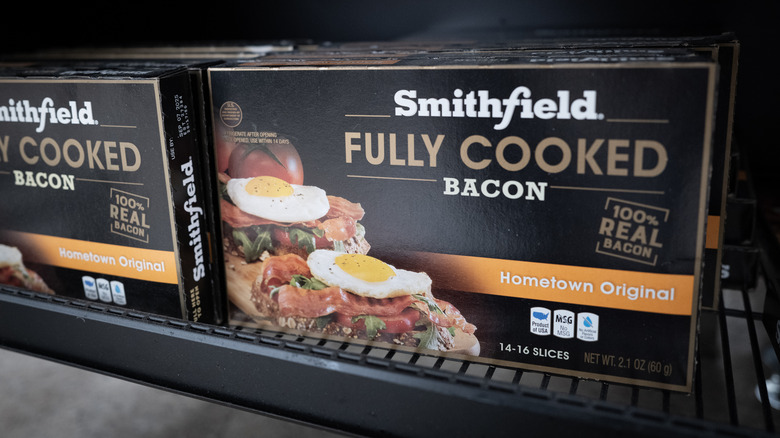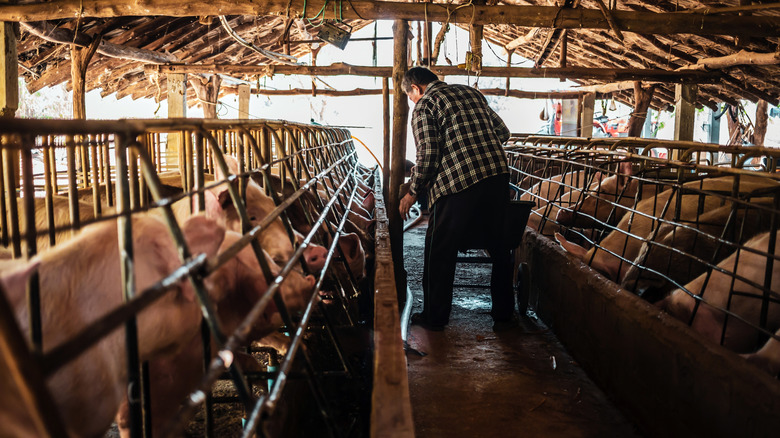The Biggest Controversies In Smithfield Foods History
Once a little meatpacking company formed in Virginia in 1936, Smithfield grew into one of the largest food producers in the United States. Specializing in pork, Smithfield helped elevate and popularize the Virginia ham and assisted in making bacon a key player in the classic American breakfast, along with processing all kinds of pork, pork-based breakfast meats, deli meats, and more. While Smithfield became a household name as a purveyor of fine and special meat products, it no longer makes a lot of those flagship products. The last genuine Smithfield ham is on display in a Virginia museum, for example, and a lot of its offerings, such as its staple American hot dog, is made by a Chinese company.
But that stuff isn't even controversial in the long run; those are just the results of business decisions, made to stay competitive and relevant in the ever-contracting and increasingly global corporate food culture. Smithfield's practices, power, and company culture, however, have led to a shockingly high number and variety of scandals and controversies. Here are all the times that Smithfield has made headlines — and not for the quality or deliciousness of its ham, bacon, and sandwich meats — and invited scrutiny and government investigation.
Smithfield didn't improve its animal welfare practices
Seemingly listening and responding to criticism from animal rights and food watchdog organizations, Smithfield declared in 2007 that it would stop using an animal growth method called gestation crates. As the world's largest pork processor in the world, Smithfield would have changed the industry standard once it completed its planned and announced phase out of the concept.
Cited by the Humane Society as particularly brutal to mother pigs, gestation crates consist of fencing placed around pregnant pigs that have been confined to areas about the size of their own bodies, fully limiting movement. Animal welfare groups praised the move, both at its outset and in 2018 when Smithfield Foods announced that it had almost entirely eliminated gestation crates in favor of a more hospitable farming environment where pigs could move around somewhat. The only hogs subjected to such conditions at that point, Smithfield said, were those awaiting insemination.
But according to Direct Action Everywhere, which placed spies at multiple Smithfield-run pig farms in North Carolina from 2017 through 2018, Smithfield had lied. It was still readily and frequently using gestation crates, particularly to keep pregnant hogs and hogs that had recently delivered babies. Smithfield promised to launch an investigation into the matter, while also saying in a statement that the pigs in crates DxE reps saw and photographed were actually in slightly different crates, or weren't actually pregnant.
Smithfield was accused of using child labor
Fast food has a child labor problem, and the industrial food production sector just might, too. Smithfield Packaged Meats is a division of Smithfield Foods, and it operates a production facility in St. James, Minnesota. The state's Department of Labor and Industry launched an investigation into the plant's labor practices, and discovered multiple objective violations of strict state laws regarding the employment of workers under the age of 18, committed over a two-year period.
The analysis discovered that between April 2021 and April 2023, the facility utilized 11 minors, aged 14 to 17, three of whom started working for Smithfield at 14. Nine of those 11 underage workers served on shifts past the latest times allowed by state law, and all 11 were subject to work that made them more likely to suffer bodily injury. Smithfield denied any knowledge of the St. James plant illegally hiring children and violating labor laws. However, it did agree to be more conscientious of such legal stipulations in the future and paid a $2 million settlement to the state of Minnesota without having to admit any fault.
Smithfield engaged in price-fixing
"Supply and demand" is probably the most basic tenet of economics: If a product is plentiful, it's harder to charge a premium for it. Rare things are by their nature scarce, and can command a higher price. Smithfield Foods controls a large percentage of the pork market in the United States, and the company was alleged to have colluded with other major players in its sector to limit supply in order to drive up demand, and then prices on its products.
Suits at the supplier, restaurant, and consumer level all sought to prove that Smithfield had behaved in such a manner between 2009 and 2022. It had produced plenty of pork, and had the capacity to produce enough to meet even the high demand of the general U.S. market, but it had consciously and deliberately held back a large amount of product from distribution so it could claim scarcity with clients and charge them more. Smithfield never admitted culpability, but settled all of the suits with giant payouts. It paid out $83 million to plaintiffs in the direct purchase and ingredient supplier case, $42 million to restaurant supply companies, and $75 million in a class-action consumer case.
Smithfield allegedly generates a lot of pollution
Abiding by environmental law isn't just a legal requirement for large companies that make and process things, it's also terrific for a conglomerate's reputation and public image. It's a very marketable notion to be viewed by the world as a good company, one that's doing right in terms of ecology and environmental factors. In the 2020s, Smithfield Foods told the world that even though it variously slaughters millions of hogs each year to acquire the raw materials for a variety of pork products of various levels of processing, it operated in a fashion that was generally healthy for the planet, specifically undertaking measures with an eye toward resource sustainability.
In 2021, Food and Water Watch, Pennsylvania Farmers Union, and other food industry and consumer interest groups filed a 47-page complaint with the Federal Trade Commission, alleging that Smithfield's positive environmental record and sustainability claims were patently false. Accusing the pork company of misleading customers and potential customers with mistruths, the complaint pointed out that Smithfield is potentially the U.S.'s third-biggest source of water pollution, and that in 2019 alone it was cited for environmental law violations on 66 separate occasions.
Smithfield faced a record fine for pollution in the 1990s
In August 1997, Smithfield Foods, by way of two wholly-owned divisions, set a new corporate record in the United States — but not in a good way. The U.S. District Court, out of Norfolk, Virginia, issued a $12.6 million fine against the corporate entity, the largest ever ordered due for violating the Clean Water Act.
Smithfield Packing Company and Gwaltney of Smithfield both operate pig slaughtering and processing facilities in the town of Smithfield, Virginia. Those meat factories feature in-house treatment operations to manage the tremendous waste created in meat processing. In May 1997, a court determined that the companies didn't employ proper pollution-reduction technology for at least five years, and therefore expelled tremendous amounts of waste and wastewater into the nearby Pagan River, James River, and Chesapeake Bay. Samples of the water detected significant levels of coliform, a bacteria that can make people get very sick, and which is found in the intestinal waste and feces of animals like pigs.
Altogether, Smithfield-owned companies were found to have exceeded dumping limits for coliform, phosphorus, and other dangerous substances. The company was also guilty of faking documents and getting rid of unflattering water quality test results.
Smithfield had to recall about 11,000 pounds of pepperoni
Smithfield Foods does business through a number of other names, including the Smithfield Packaged Meats Corporation, which operates numerous subsidiaries, including Nebraska-based Margherita Meats. In December 2021, that division was subject to a deli meat recall that affected millions of potential customers when the U.S. Department of Agriculture's Food Safety and Inspection Service announced an issue with the company's pepperoni. The U.S. Department of Defense conducted a regular safety test on a sample of Margherita Meats' ready to eat and packed pepperoni, and it came up positive for Bacillus cereus, a foodborne illness that presents with a series of particularly egregious symptoms. The toxins made by the microorganism can lead to vomiting and diarrhea in those who eat contaminated food, and it's especially hard on the immune-compromised.
Smithfield, along with the FSIS recalled 8-ounce size shrink-wrapped containers of unsliced product labeled Margherita Pepperoni produced under a single lot code in June 2021. No illnesses were reported to Smithfield or the government by the time that the recall was announced, six months after the meat entered distribution, but 10,900 pounds of the processed meat had to go back to Margherita.
Smithfield recalled 93 tons of pre-cooked bacon
Smithfield Foods is the parent company of Smithfield Packaged Meats Corporation, which provides supermarkets around the country with fully packed, sealed, and preserved meat-based items, like bacon that has already been cooked and processed into a shelf-stable and ready-to-eat form. One of those products is bacon crumbles, and it's all the same stuff no matter whose name is on the label, be it Golden Crisp Patrick Cudahy Precooked Bacon Topping, Smithfield Precooked Bacon Topping, or Member's Mark Fully Cooked Bacon Crumbles.
In May 2022, Smithfield recalled five different permutations of its bacon bits and crumbles, all sold in five-pound packages and all produced around the same times and in the same facility. After one customer called the company to let them know about the discovery of a metallic object in one of its products, Smithfield recalled a grand total of 185,000 pounds of bacon topping, all of it processed between February 21 and February 23, 2022, and March 3 to March 5, 2022. The bacon had made its way into grocery stores in 18 states in every region of the contiguous U.S. Fortunately, at the time of the recall, no injuries from the accidental consumption of metal had been relayed to Smithfield or the Department of Agriculture's Food Safety and Inspection Service.
Smithfield slaughterhouses were so smelly that the courts got involved
Large-scale hog farming operations generated a tremendous volume of effluent, or hog urine and feces. In eastern North Carolina, a significant hotbed of hog farming on facilities operated by Smithfield Foods subsidiary Murphy-Brown and other companies, lawyers in 2013 began building cases regarding the nuisance and health concerns associated with the lagoons where the effluent is stored awaiting conversion to fertilizer. Attorneys would eventually file 26 lawsuits involving 500 plaintiffs who lived nearby Smithfield farms seeking financial damages to make up for the odors they endured from waste and hog carcasses, as well as nausea, headache, and insect and buzzard investigations.
"We've said from the beginning that we believe these lawsuits are without merit," Smithfield Foods corporate affairs director Don Butler told the News and Observer. "Nobody's arguing that there's not odors associated with livestock production, but it is a safe and manageable system with negligible odors when properly managed."
One of the largest cases resulted in a $473.5 million judgment in 2018 against Smithfield operations, with the state of North Carolina capping at $94 million going to six pig farm neighbors. Another case resulted in residents who lived near hog-farming facilities receiving anywhere from $100 to $75,000 in retributive payments, while a judge in Raleigh tossed out another due to a lack of evidence that the nuisance was so great as to justify Smithfield having to make financial amends.
Smithfield was implicated in a human trafficking scandal
Circle Four Farms in Utah is among Smithfield Foods' most prolific farming operations. From 2005 to 2007, it contracted with Global Horizons to find workers, and that recruiter brought in a group of rice field workers from rural Thailand, lured to the U.S. with promises of employment at a wage that would elevate them out of subsistence-level farming.
Laced with predatory actions, the whole thing was a scam at worst, or, as it was called by an investigation by the U.S. federal government, a human trafficking operation. Global Horizons, on behalf of Smithfield, told the Thai laborers that they'd be paid $69,660 over the span of three years, but they first had to pay an exorbitant recruitment fee of $14,516. Once they arrived in the U.S., Global Horizons confiscated passports, preventing their free movements or returning to Thailand. And while they were paid the contracted amounts at first, many noticed that Global Horizons stopped paying them, or ceased transferring their paychecks to their families in Thailand. Often, they were made to sleep in rooms with security guards posted outside without proper heating or cooling, making for brutally hot summers and frigid winters. The employees say they also were not fed enough, and resorted to trapping birds to cook and feed themselves. "We were slaves," one former employee told the Deseret News.
Coronavirus majorly impacted Smithfield operations
Some businesses did just fine amidst COVID-19, while others economically suffered due to shutdown orders and shifting consumer habits. Smithfield Foods continued to procure and produce meat products for homebound Americans through its network of plants, including large units in South Dakota and Wisconsin. Those plants reportedly didn't institute distancing rules or other safety measures to protect its employees from the spread of the very virulent virus in the early days of the coronavirus pandemic in the spring of 2020. By mid-April, the Smithfield site in Sioux Falls was the single biggest COVID-19 infection zone in the U.S. Without a stay-at-home order yet in place, 644 employees and 135 of their closest contacts were discovered to have caught the virus. That made up half of all South Dakota infections at that point, while one of those workers became the first person in South Dakota to die from COVID-19.
Over in the Patrick Cudahy plant, a Smithfield-run meat processor in Cudahy, Wisconsin, the pandemic hit hard in March 2020. In the wake of an outbreak, management didn't offer masks or protective gear or allow workers to not work in close proximity to one another and strongly discouraged self-quarantining by those experiencing symptoms of COVID-19. Additionally, statistics about the rapid infection rate were reportedly hidden by Smithfield representatives.
